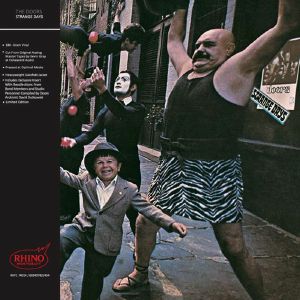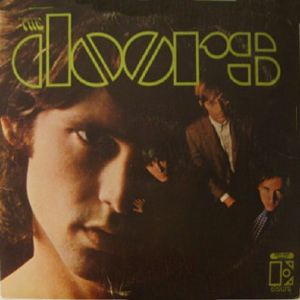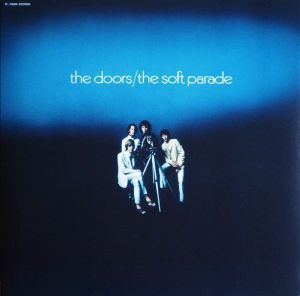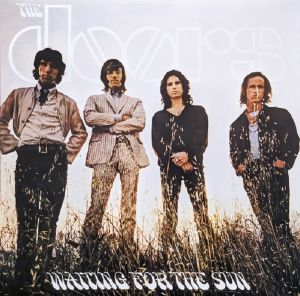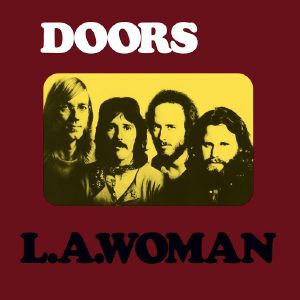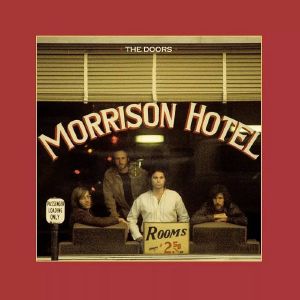Receive new release alerts for Rhino High Fidelity US
Filter
Genre
Type
Music
Format
Artist
Featured
Release Title
Price
Rhino High Fidelity US Vinilo y CD
Browse the latest Vinyl & CD releases on Rhino High Fidelity USSimilar labels:
Artículos del 1 al 6 de 6 en la página 1 de 1
Review: "I've always loved the Doors. I know it's kind of fashionable to think the Doors are naff, but I don't give a f*ck about that." The words of Matt Berry, not ours. But we have to agree. The songs here on The Doors' second album are some of the finest to ever be pressed onto wax. 'People Are Strange' is one of the most stunning singles ever and 'Love Me Two Times' is one of the catchiest songs of the 60s. The Doors were at the forefront of innovation in rock and so they included a wide range of instruments, including the marimba and they were among the first in rock to incorporate the Moog synthesizer. Their producer, Paul A. Rothchild, was instrumental in this, providing a then cutting edge eight-track recording machine. The results of recording to tape like this are supreme and it's no wonder people are returning to this style, favouring it ahead of clunky computer-based programmes.
… Read morecoming soon $38.84
Review: Many of The Doors' albums are being reissued right now and few are better than their self titled effort. This is a remastered edition of the legendary 1967 debut featuring iconic tracks like 'Break on Through (To the Other Side),' 'Light My Fire' and 'The End' which are all now staples of the musical canon and very much show the band's unique blend of psychedelic rock, jazz and blues. With Jim Morrison's haunting vocals, Robby Krieger's inventive guitar work, Ray Manzarek's distinctive keyboard riffs and John Densmore's dynamic drumming, The Doors remains a classic in rock history.
… Read morecoming soon $39.94
Review: The Doors' fourth album The Soft Parade was a remarkable return to form in the milieu of jazz rock and pop rock. This was a bold stylistic move made in seeming response to fan distaste at their third LP, 1968's Waiting For The Sun, an album deemed lethargic by some critics compared to their earliest smashes. And yet despite gruelling tour schedules and tumultuous intra-group dramas, The Soft Parade remains a controversial record, again inciting critical accusations of sellout co-optation by the AOR industry machine in the blue corner, and in the red, curious endearments to the Doors' brachiations in jazz ('Touch Me') and banjo blues ('Runnin' Blues').
… Read morecoming soon $39.94
Hello, I Love You
Love Street
Not To Touch The Earth
Summer's Almost Gone
Wintertime Love
The Unknown Soldier
Spanish Caravan
My Wild Love
We Could Be So Good Together
Yes, The River Knows
Five To One
Review: The third album by The Doors from 1968 made heavier use of improvisation, opposing their earlier reliances on pure composition. Responsible in large part for what has become known as "third album syndrome" - the tertiary equivalent of the infamous "sophomore slump", whereby, in either case, bands struggle to come up with original material after a stonking debut or two - the album provoked mixed reactions on release, owing to its loosened, comparatively slack sound, in contrast to their raucous debut and second LPs. While Jim Morrison's worsening alcoholism provoked such skepticisms at the time, the album was embraced by fans in hindsight, and now this Rhino Records release cements that legacy with new original liners and rare photos. Elements of their original sonic buzz still remain, as on the title track, where twinging stereo twangs complement expectant, purgatory tenors from Morrison.
… Read morecoming soon $39.94
Review: Amid a comprehensive Doors reissuing effort by Rhino Records comes a new re-press of their storm-whipping sixth record. Infamously the last album to feature the band's leading symbolic light and 27-club member Jim Morrison - who died two months after the album's release - LA Woman does indeed sound like a last hurrah, reigniting the band's debutant rollicking rock flame after a relatively dozy lull in sound at their career mi point. Marked by rip-roaring blues and a latterly throatier vocal delivery by Morrison, 'Been Down So Long', 'LA Women', and 'Hyacinth House' evidence a loyalty and an obsession with classic and raw blues. The jangly hit single 'Love Her Madly' would be one of the few songs on the record not to incorporate the Southern American sound, by and large. Steeped in a controversial history encircling the Doors' later career - Morrison had been charged with profanity and indecent exposure for stripping naked at a concert in Miami in the year before recording - LA Woman does indeed have a righteous, raunchy, flippant, "f*** it" charge about it.
… Read morecoming soon $38.84
Review: This is The Doors' masterpiece - their Led Zeppelin IV; their Dark Side Of The Moon. Jim Morrison and co. dimmed down the synth, brass and strings of their previous album, The Soft Parade, and cranked up their blues rock DNA. Already home to the likes of the Yardbirds and Cream, the British public lapped up this invigorating new sense of direction and upon its release in 1969, it became their biggest UK chart success. 'Roadhouse Blues' is a rabble-rousing performance with a sense of swagger and snarl that reflects the character of the then bearded Morrison, who was looking a far cry from the clean shaven boho poet that entered the scene earlier on in the 60s. Another banger on here is 'Indian Summer'. Although for totally different reasons. It's no wonder this track was used to soundtrack the desert peyote trip in Oliver Stone's Doors film, as it's among their most languid and psychedelic work ever.
… Read morecoming soon $38.84
Artículos del 1 al 6 de 6 en la página 1 de 1

 USD
USD





